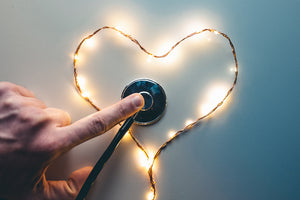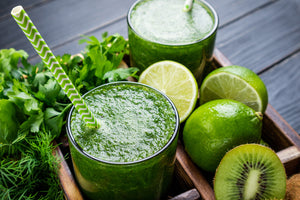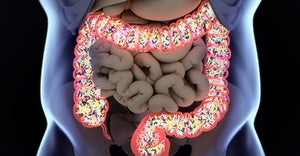Digestive Issues? Here’s What You Can Do to Tame Them

“After your meal, sit a while, then walk a mile.” - Dr. Bernard Jensen
Good digestion. When it’s all working smoothly, we tend to take it for granted, but when things get out of balance it can quickly become all we think about. Heartburn, bloating, nausea, diarrhea - we may make jokes about them, but these symptoms of poor digestion can make us feel downright miserable, not to mention antisocial.
Digestive disorders have risen dramatically in recent years, likely because our fast-paced lifestyles contain many elements that contribute to problems, such as high stress levels, too much time spent sitting, not enough movement and definitely not enough quality sleep. If you experience pain in your digestive system, it is of course important to see your family doctor so that they can help you rule out any medical issues. The good news is that if a medical issue is not the reason, it’s often possible to get your digestion back on track by implementing a handful of simple, lifelong habits.
Let’s look at some ways you can figure out that funny tummy, reclaim your social life and feel confident that what you eat is truly nourishing your body.
8 Proven Habits to Support Your Digestion Every Day:
Eat a Whole Food Diet
A “whole food” diet means opting for the most natural, least-processed version whenever possible, no matter what form your diet takes (balanced, low carb, vegetarian, etc). A whole baked apple instead of apple pie, for example, a handful of nuts over a protein bar, or whole grain over refined white flour. This is the best way to make sure your food contains all of its essential nutrients and enzymes so that it is nourishing and easier to digest. Not to mention that the additives and excess sugar found in many processed foods can feed the bad bacteria in your gut, contributing to gut irritation, bloating and cramps.
Drink Plenty of Water
One of the most common culprits for constipation is dehydration. Water serves 4 main functions in digestion. First, it is necessary for your body to produce the various digestive enzymes and juices that help break down your food. Next, it is the vehicle nutrients ride in so that your body can absorb them easily. It also helps to keep things well-lubricated so that the fiber you eat turns into a soothing, puffy gel and your digested food moves easily through your intestines. And finally, water is a fundamental ingredient in muscle movement - and your gut is essentially a long tube made up of muscles that need to contract in a specialized wave-like motion called “peristalsis”. Well hydrated muscles are able to contract as needed to push the digested food through the gut and out of the body so that it doesn’t sit around for too long and start to cause irritation.
Unfortunately digestion isn’t always the body’s top priority. Survival takes precedence, so if your body senses that you need more water elsewhere in the body such as your brain or legs (fight & flight), it will redirect water from your gut to serve the immediate survival need, making your stools harder to pass.
Choose High Fiber Foods
As healthy fiber from whole grains, beans, lentils, nuts and seeds, fruits and (most importantly) vegetables passes through your body, it absorbs water and other fluids to form a gel-like substance that feeds the good bacteria and soothes the gut wall. It helps provide bulk to stools, which helps them move along the digestive tract more easily, contributing to regularity and that sometimes elusive feeling of complete elimination.
However, it is important to remember that if you currently eat a low-fiber diet, you must be careful not to ramp up your intake too quickly, as that can lead to gas, discomfort and, ironically, constipation. Make sure you increase your fiber intake slowly over a few days or weeks - especially if you are adding an extra fiber supplement such as freshly ground flax seeds - while also drinking more water as the fiber itself can absorb a lot.
Eat Consciously
As mentioned above, stress has a way of messing with digestion. So keeping stress low is particularly important during mealtimes. You can achieve this by simply slowing down, avoiding eating on the go, and making a conscious effort to sit down at a table to eat your meal.
Turn off the TV, take slow, deep breaths and pay attention to the pleasure of good food. Use your senses throughout the meal - taste, smell, textures - food should be enjoyed after all. Savour every bite instead of absent-mindedly snacking while thinking of something else and you’ll improve digestion by putting your body into “rest and digest'' mode and giving it all the right signals to trigger the necessary digestive enzymes. Not to mention, conscious eating helps to reduce the chance of overeating to the point of feeling too full.
Chew Your Food Properly
What’s the rush? When you chew your food, you’re starting the digestive process. The mechanical action of your teeth breaks food into smaller pieces to increase its surface area, so that digestive enzymes can get to work. Chewing also triggers the production of saliva, the first enzyme in a cascade of different enzymes, each triggering the next to achieve complete digestion and absorption of nutrients from your food.
Aim to chew your food 20 - 30 times before you swallow for best results. That’s right, just like Grandma told you.
Support Your Digestive Enzymes
If chewing your food doesn’t go far enough towards easing an overly-full feeling after meals, try supporting your digestive enzymes more directly. This can simply mean taking a shot of apple cider vinegar before meals to provide enough acid to trigger stomach digestion. Alternatively, chewable digestive enzymes made from papaya and pineapple actively break down protein in your food, and more comprehensive and targeted digestive enzyme supplements are available too.
Feed Your Good Bacteria
Your digestive tract contains trillions of good bacteria that support gut health by breaking down specific carbohydrates, soothing the gut wall and producing hormones such as serotonin, the “feel-good hormone”. Maintaining that microbiome is essential for avoiding digestive problems like gas, bloating, constipation, and diarrhea - and for mental health.
Make sure to eat a wide variety of healthy whole foods to help sustain them, and fermented foods to help replenish them. These include unsweetened probiotic yogurt, kimchi, kefir, miso, and sauerkraut.
Probiotic supplements can help replenish and balance your gut bacteria if food alone isn’t enough at first. Research suggests they’re an effective supplement to reduce the symptoms of existing digestive problems.
Move Your Body
This brings us back to the quote from digestive health pioneer Dr. Bernard Jensen: “After your meal, sit a while, then walk a mile.” The reason for this suggestion is simple: When you move, your digestive system moves. Scientists have found that exercise can improve the rate at which you digest food. Gravity and movement stimulate peristalsis by helping to trigger various “fullness” receptors in your colon. This results in more muscle movements pushing your digested food through the digestive tract at a regular pace.
By the way, exercise also reduces stress, boosts energy, improves mood and supports good heart health.
Digestive symptoms like bloating, diarrhea and indigestion shouldn’t be holding you back from enjoying life. If you’d like to talk about further strategies, lab tests to check the status of your microbiome, or you simply want help creating a plan to implement these tips, contact us today.
References:
Dr. Bernard Jensen. Dr. Jensen's Guide to Better Bowel Care: A Complete Program for Tissue Cleansing through Bowel Management. Avery; 1190th ed. edition (Sept. 1 1998)
Anderson JW, Baird P, Davis RH Jr, Ferreri S, Knudtson M, Koraym A, Waters V, Williams CL. Health benefits of dietary fiber. Nutr Rev. 2009 Apr;67(4):188-205. doi: 10.1111/j.1753-4887.2009.00189.x. PMID: 19335713.
Everhart JE, editor. The burden of digestive diseases in the United States. US Department of Health and Human Services, Public Health Service, National Institutes of Health, National Institute of Diabetes and Digestive and Kidney Diseases. Washington, DC: US Government Printing Office, 2008; NIH Publication No. 09-6443.
Boekema PJ, Samsom M, van Berge Henegouwen GP, Smout AJ. Coffee and gastrointestinal function: facts and fiction. A review. Scand J Gastroenterol Suppl. 1999;230:35-9. doi: 10.1080/003655299750025525. PMID: 10499460.
Oettlé GJ. Effect of moderate exercise on bowel habit. Gut. 1991 Aug;32(8):941-4. doi: 10.1136/gut.32.8.941. PMID: 1885077; PMCID: PMC1378967.
McFarland LV. Use of probiotics to correct dysbiosis of normal microbiota following disease or disruptive events: a systematic review. BMJ Open. 2014 Aug 25;4(8):e005047. doi: 10.1136/bmjopen-2014-005047. PMID: 25157183; PMCID: PMC4156804.
- Dr. Brady







Comments 0